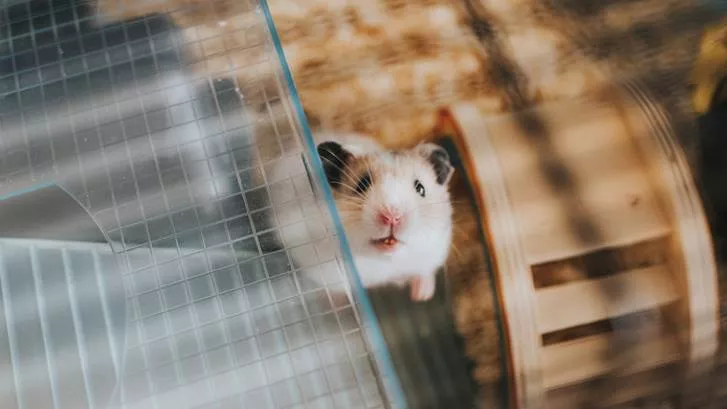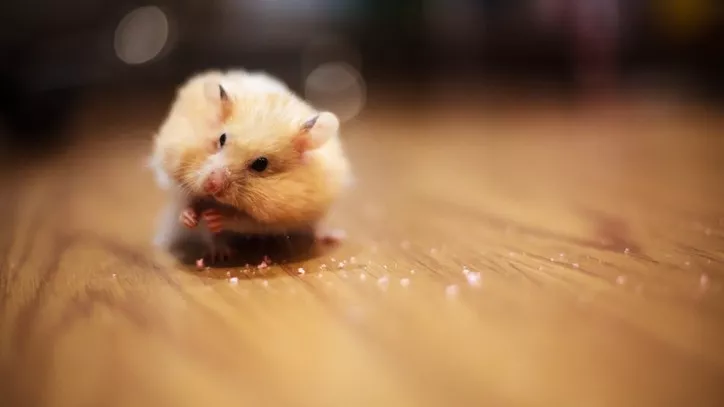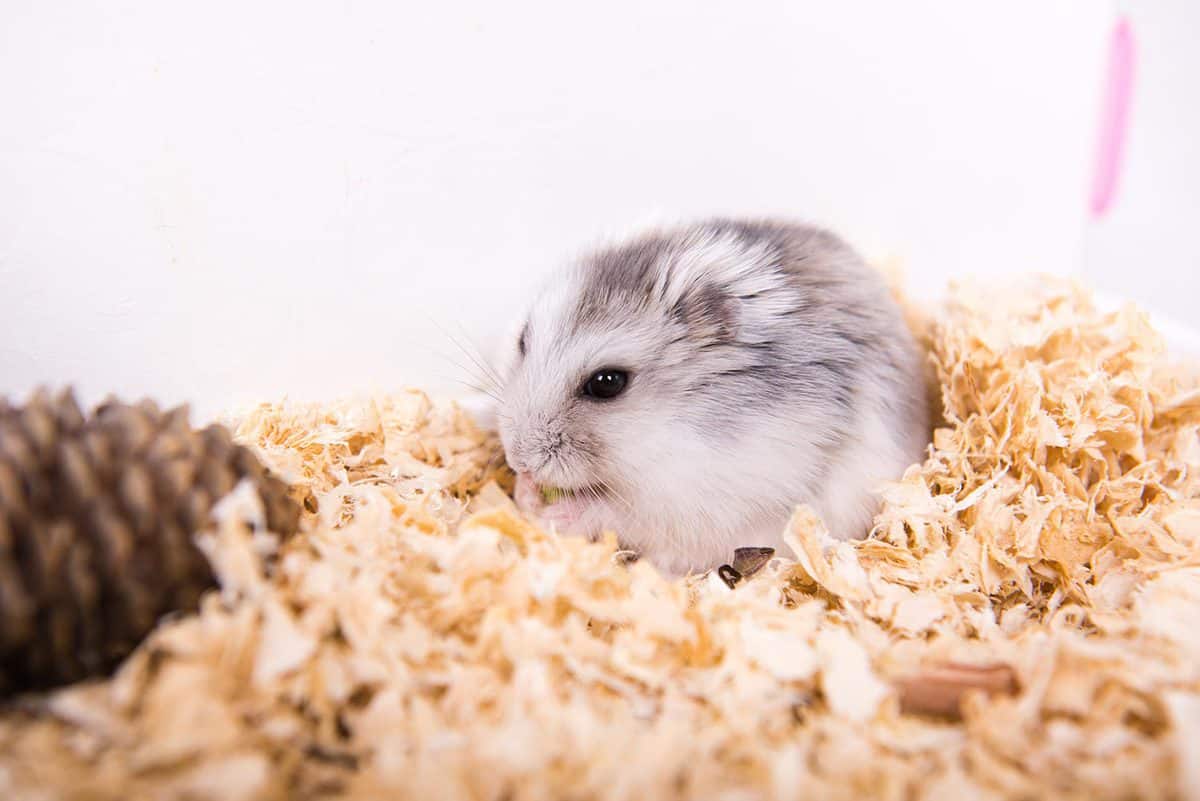When people think about getting a pet, even a small and low-maintenance one like a hamster, one of the most important things they think about is how much mess they will make and if they smell.
Most people don’t like or want bad smells in their homes, and a common question from new pet owners is whether or not hamsters smell.
Hamsters are very clean animals that don’t smell or have bad smells because they clean themselves.
If you smell a bad smell coming from your hamster, it’s probably coming from the cage. This could be because the owner doesn’t take care of the cage or clean it often enough.
One of the best things about having a hamster as a pet is that they are easy to take care of and clean up after. You don’t even need to bathe them, and it’s actually not a good idea!
There will be times, though, when you notice bad smells coming from your hamster’s cage.
It’s important to know the difference between natural smells, signs that the cage needs to be cleaned, and times when you might need to take your hamster to the vet.
Do Hamsters Smell?
Hamsters are very clean animals that clean themselves very well. If you want a pet that is easy to keep clean, hamsters are one of the best choices. The reason for this is that hamsters clean themselves very well on their own.
The main reason is that hamsters are at the bottom of the food chain and need to do everything they can in the wild to avoid getting eaten.
Hamsters clean themselves often to get rid of any smells that could be picked up by their enemies.
Even after you’ve handled your hamster, you’ll find that they still like to be petted every once in a while, but as soon as you put them down, they’ll start cleaning themselves to get rid of your scent.
A hamster that cleans itself will also coat its fur. Washing a hamster can remove its natural oil, leaving it vulnerable to colds and illness.
Because of this, you should never try to clean a hamster. If you do, you will not only wash away their oils, but you could also make them uncomfortable, cold, or even sick.
Even though hamsters are usually clean, their scent glands can give off a smell.
This is especially true for female hamsters when they are in heat, so it’s important to learn this smell and tell it apart from other smells you might smell around the cage.
Basically, you should clean parts of their cage once a week and do a deep clean only when they need it.
On the other hand, you shouldn’t clean your hamster’s cage too often because it can make your hamster stressed and shorten its life.
If you just cleaned your hamster’s cage and it still smells, you need to look into other causes.
How Can I Keep My Hamster Smelling Great?
A lot of the work of keeping the hamster’s body clean and fresh is done by the hamster itself. The cleanliness of these animals is very important to them, so they are not dirty.
Your hamster will often clean themselves in their cage. They groom themselves with their paws or nails, though some do it more than others.
Self-grooming is the best and safest way for hamsters to take care of their fur. The oils in their fur and skin help keep their bodies warm and protect them.
Self-grooming doesn’t remove these oils like taking a bath would. In fact, you should never give your hamster even a small amount of water to bathe in.
Sand baths are a great way to help keep your hamster clean and happy. Wild hamsters clean themselves by taking sand baths, so by giving them one, you are also helping them stay in touch with their natural instincts.
This helps spread the natural oils on their bodies and keeps their skin and fur clean without using water.
So, it’s not likely that your hamster will be an animal that smells bad. The cage they live in and how well it is kept up is a much more important question.
Why does my hamster smell so bad?
Scent glands in hamsters can produce some unpleasant odors.
In addition to the bathroom odors, you need to clean the cage for the aroma secretions released by these glands, which are released into the bedding.
This is why you need to do a full clean and sterilization of the cage and all the structures in it once a month.
How to Keep Your Hamster Cage Odor Free

Even though hamsters usually clean themselves, a bad smell might come from the hamster’s surroundings rather than the hamster itself.
For this reason, keeping the cage clean is important if you want it to smell good.
The best way to keep your hamster cage from smelling bad is to clean it on a regular schedule and stick to it.
It is suggested that you clean your hamster’s cage once a week and that you do a very thorough job of it.
You should also check the cage every day and clean out any dirty bedding, poop, or old food that has gone bad.
To clean your hamster’s cage properly, you should empty all of the food and water bowls and scrub the cage with mild soap.
This should be done everywhere, including the wheel, toys, and food bowl, so that the whole cage doesn’t smell.
You might notice that hamsters go to the bathroom in the same place every time. This is usually in a corner of the cage that is farthest from their bed.
You can use this to keep the cage from smelling bad all week.
You could also potty train your hamster (yes, this really works!) as another way to keep the cage clean during the week.
How to get rid of hamster smell

1. Regularly clean out their cage.
When you keep hamsters, the main source of the smell that could be a problem is urine that builds up in their cages and bedding.
Hamsters will urinate as far away as possible from where they sleep, both because they have sensitive noses and because they don’t want predators to find their hiding place.
Regular cage cleaning will cut down on this smell, so if you are willing to put in the work, you can keep your furry friend’s cage from smelling too bad.
When hamsters are taken out of their cage too often, they can get scared, so it’s a good idea to give them another fun place to hang out while you clean their home.
Once a week, a complete bedding change and deep cleaning with a disinfectant safe for hamsters are about the right amount to make both the hammy and your nose happy.
Our guide on how to clean your hamster’s cage has more information about this.
Since most of the smell comes from where they urinate, these spots should be cleaned more often. Find the wet spots on their bedding and change them every two to three days.
This will stop the smell from getting worse and won’t bother your shy friend. You can make this easier by putting a small tray or litter box where they are already peeing.
When they are sleeping in their hideout, this can be easily taken out and cleaned.
2. Check for signs of illness
Compared to their urine, excrement is less of an issue. It is usually dry and doesn’t smell.
If their poo is smelly and wet, this can be a sign that your hamster is unwell and a trip to the vet is in order.
It can be a sign of a ‘wet tail’, a common disease in hamsters.
3. Clean out any hidden food.
Hidden food can also be a contributor to a stinky enclosure.
Unless it becomes wet, dry food will not smell unless it has rotted, but fresh food like broccoli and cabbage will produce sulfurous smells.
Again, frequent cage cleaning should take care of this problem, as it does for any other problem.
Do hamsters smell more when they are frightened?
Anxious hamsters urinate more frequently than calm ones, which results in a more pungent odor.
Additionally, they may spend more time establishing their territory, which could lead to an increase in scents.
To avoid making your hamster feel intimidated, keep your interactions gentle.
Be careful that hamsters, whose noses are far more sensitive than ours, will be bothered by strong perfumes and aftershave.
Should I keep my hamster in my bedroom?
Keep your hamster in your bedroom as long as you maintain a regular cleaning schedule.
Try to keep your hamster’s cage out of direct sunlight or draughts, which can cause it to smell more.
It’s important to keep in mind that hamsters are extremely sensitive to noise and movement.
Distressing your hamster can cause them to urinate more, so keep it in a quiet setting if possible.
Other electrical items, such as televisions, emit ultrasonic, which can also be detected by the narrator.
Keeping hammy in the same room as you shouldn’t be a problem as long as your room has a peaceful place away from these machines and other noise sources.
How to Potty Train Your Hamster
The chore of teaching your hamster to go to the bathroom in a specified location is actually a simple and successful one.
Even though it may seem impossible, it is possible to educate your hamster to go to the bathroom in a specific location as long as you keep an eye on your hamster’s toilet habits.
Hamsters have a tendency to go to the bathroom in the same place in their cage over and over again.
As in the wild, hamsters will often go to the bathroom away from their burrows in order to keep the stench at bay.
It is possible to utilize this to locate the bathroom. Once you’ve found the ideal area, you may begin training your hamster by following these steps:
- Place the potty in the area where the hamster normally relies on the restroom.
- Fill it with sand to help hide the odor.
- Place anything smelling like hamster urine inside the potty to help hamsters learn to use it as a toilet.
Getting used to this new practice may take a few weeks, but it will pay off in the long run by keeping your hamster cage clean and free of odors.
Do hamsters smell when they die?
It takes a while for a dead hamster to begin smelling, but it will eventually.
How long this can take depends on the room’s temperature. The fragrance would become unbearable in most homes after three days.
It is therefore advisable to bury your dead hamsters immediately upon discovery, regardless of how heartbreaking it may be.
Latex gloves should be worn when doing this as well as removing all of their bedding and food as well as cleaning and disinfecting their cage.
Should I give my hamster a bath?
Do not immerse or even wet your hamster in water in the classic sense.
The natural oils in their coats that keep them warm will be removed if they are exposed to water, especially dirty water.
When they are wet, they can become extremely vulnerable to sickness. As a result, it is best to prevent all contact with water.
Keep the area where you used the moistened tissue warm for a few hours afterward to help remove embedded grime.
A sand bath is another option for them to fully clean themselves, as they roll around in it.
By doing this, they can get clean the way they would naturally. Even a tiny dust particle might cause respiratory problems in your pet, so make sure you buy sand and not dust.
Conclusion
Hamsters are one of the cleanest and least odorous pets you can have.
If you notice a scent coming from your hamster, it could be from their glands, they may have rolled around in something, or it is most likely from the cage.
Cleaning your hamster’s cage once a week and potty training it (to easily keep it clean on a daily basis) are simple ways to keep your hamster and its environment clean and scent-free.
Never bathe a hamster; you can use bath sand to rub anything off their coat, but the hamster will clean itself with surprising regularity.
Any observably bad odor emanating from your hamster for an extended period of time would be the only real indication of a problem and would be the appropriate time to seek veterinary advice.






